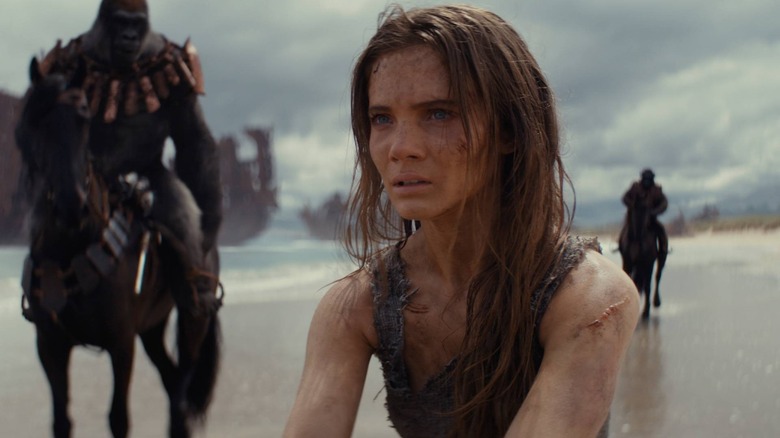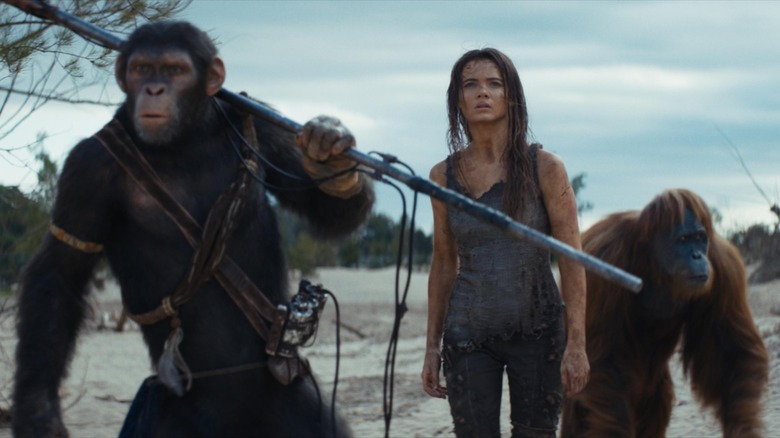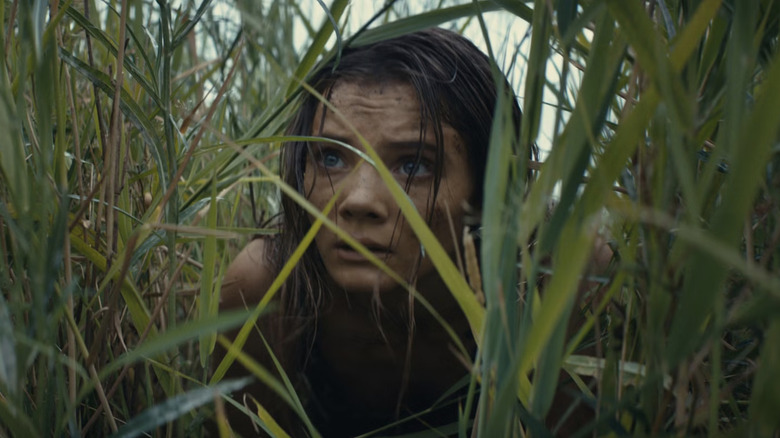Kingdom Of The Planet Of The Apes Shares DNA With One Of The Best Horror Stories Of All Time
This article contains spoilers for "Kingdom of the Planet of the Apes."
Wes Ball's "Kingdom of the Planet of the Apes" isn't a reboot of the beloved franchise, nor is it a direct sequel to the most recent trilogy ("Rise of the," "Dawn of the," "War for the,"), but instead a standalone sequel set hundreds of years after the time of Caesar, the evolved patriarchal leader played by Andy Serkis. Caesar in this series differs from the character played by Roddy McDowell in the original, as this version sees apes and humans as unlikely equals rather than inherently viewing the latter as subservient, and even lets fellow ape Koba fall to his death for ruining the chance for apes and humans to have peace.
Humans are being ravaged by the simian flu, a condition that allows the apes to flourish from an evolutionary standpoint but wipes out a majority of humanity. Those that survive due to genetic immunity splinter into small communities, but two years after the Human-Ape War, the virus evolves and instead of killing humans, the newly neuro-degenerative virus deteriorates the human brain, causing loss of speech and intellect.
By the time of "Kingdom of the Planet of the Apes," humans are little more than feral prey. An ape king named Proximus Caesar (Kevin Durand) has distorted Caesar's teachings, using modified human technologies to forge weapons and enslave humans and other apes. It has been so long since apes have seen intelligent human life that most apes don't know humans were ever intelligent, so when the seemingly feral Mae (Freya Allan) reveals to the chimpanzee Noa (Owen Teague) and wise orangutan Raka (Peter Macron) that she can speak, it inspires a literal jaw-drop. There was a lot of speculation surrounding Mae's intelligence after the trailers first dropped, but the reality is that Mae might as well be pulled straight out of Richard Matheson's "I Am Legend."
Mae carries the dark history of humanity
There's a quote often attributed to Winston Churchill (but there's no concrete evidence he actually said it) that says, "History is written by the victors." As the losers of the Human-Ape war, the history of humanity has all but been forgotten in the hundreds of years post-Caesar. The protagonist of "Kingdom of the Planet of the Apes," Noa, is a young ape coming of age who refers to humans as "echoes," as this is the terminology used by his clan of falconers. He only learns the name "humans" after meeting Raka, who is committed to continuing the teachings of Caesar, which have since been manipulated and weaponized by Proximus.
Part of Noa's coming-of-age journey is tied to learning the truth about humans because it informs him that the elders of his clan are fallible, are not all-knowing, and that there is more to the world and its history than he realizes. The history he knows is the history that has been established by the Apes, which also means that the history of humans is a history told through Ape eyes.
"[Mae] carries with her the darkness of the previous movies that surround all humanity," director Wes Ball told me in an exclusive interview. "They are responsible for where this world ultimately ended up." Human beings are why the world as we knew it was destroyed, in the same way that the post-apocalyptic vampire creatures in "I Am Legend" were created as a result of human war and a pandemic. Dr. Robert Neville carries that darkness in his quest for survival, as does Mae, as well as a shared hope to "get things back to normal" or "find a cure," despite all evidence proving that the world has evolved beyond that possibility. Pandora's box has been opened; there is no going back.
Humans are destined to become the stuff of legend
After Noa and Mae are taken to Proximus Caesar's colony, it's revealed that his grounds contain a massive vault, which contains human weapons, technology, vehicles, and history. Noa and his friends Anaya (Travis Jeffery) and Soona (Lydia Peckham) help Mae get into the vault, and the three discover old human children's books like ones written by Dr. Seuss. One of the books shows illustrations of a trip to a zoo, with children delighted to see apes, chimpanzees, and orangutans all caged up in enclosures. They come face to face with the history of what the world was like when humans were the dominant species, and it's an emotionally jarring realization.
There is no possible way for the world to ever go back to how things were, no matter how badly Mae wants it to. Similarly, Dr. Neville realizes at the end of "I Am Legend" that in his quest to "save humanity," he was becoming a villain in the eyes of the living-infected. "But I think what's interesting about her role is that she changes almost to become more optimistic and hopeful by the end," Ball told me.
He continued: "[Noa] offers peace, and she takes it with her to her world. So it's interesting that she starts in a dark place and ends in a place of optimism. The dynamic and relationship that forms between these two characters, as complicated as it is, as it becomes, is going to be crucial moving forward." We already know the fate of humans and apes by the time the events of 1968's "Planet of the Apes" roll around — but what happened to the recorded history between apes and humans remains a mystery. Here's hoping "Kingdom of the Planet of the Apes" is just the start of a new trilogy that can help provide those answers.
"Kingdom of the Planet of the Apes" is now playing in theaters everywhere.


